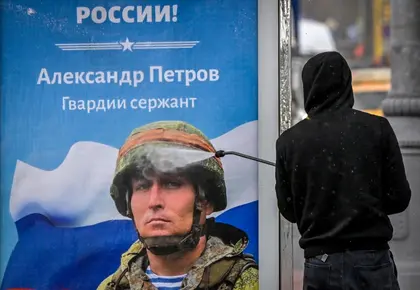Seething with anger, Russian beautician Tatyana describes the Kremlin’s military mobilisation as “complete horror.”
In early October her young nephew was called up in the town of Krasnogorsk northwest of Moscow as part of the Kremlin’s drive to prop up Russian forces fighting in Ukraine. The family, she said, had to buy everything from clothing to a first aid kit for him at its own expense.
JOIN US ON TELEGRAM
Follow our coverage of the war on the @Kyivpost_official.
“They had to purchase everything themselves, they bought a uniform, thermal underwear, medicines, and food,” 40-year-old Tatyana, who refused to give her last name for fear of reprisals, told AFP.
“When they arrived, no one was waiting for them, and nothing was organised.”
On September 21, Putin announced the start of a “partial” military mobilisation, the country’s first enlistment since World War II.
In late October, the defence ministry announced the draft’s completion, saying that 300,000 reservists had been called up.
Kremlin critics say Moscow’s chaotic mobilisation drive has shed a harsh light on a litany of problems the Russian army faces including logistical and supply challenges, mismanagement and corruption.
Tatyana said she had the impression that the decision to conduct mobilisation had been taken suddenly and caught even officials by surprise. Many men were barely trained before being dispatched to the front.

Russian Exiled Opposition to Stage Major Anti-War Protest
“Everything they say on TV about the mobilisation is just a show for the general population, in reality things are very sad,” she said.
Anna, who lives in the town of Ivanteyevka located some 20 kilometres northeast of Moscow and was born in Ukraine, is still stunned by the mobilisation of her son-in-law.
“Our relatives are being bombed in Dnipro and he will have to go and kill people in our native country,” she said with tears in her eyes.
The 51-year-old hairdresser said her son-in-law was “against the war.”
“But he has no choice: it is either going to the front or prison,” she told AFP, also declining to give her last name.
Shortly before the announcement of the call-up, Russia’s parliament approved amendments toughening penalties for military crimes in times of mobilisation, and those refusing to fight can face up to ten years in prison.
Anna said that her son-in-law had spent nearly 100,000 rubles (more 1,600 euros), or seven times the Russian minimum wage, to buy a bulletproof vest, a uniform, warm clothes, and boots, among other things.
Calls for donations spread through social media as users asked for help to buy basic equipment for newly-drafted troops.
‘Untrained guys thrown into front line’
The extent of the problems during the military mobilisation has been such that even pro-Kremlin journalists sounded the alarm.
Several journalists wrote on social media that a number of newly-drafted men from Moscow and the surrounding region were sent to Ukraine as part of the 27th motorised rifle brigade without receiving any proper training. The unit suffered heavy losses.
“Some commanders on the ground need to be shot,” one of the journalists, Anastasia Kashevarova, wrote on messaging app Telegram.
“As the result of the mobilisation, untrained guys have been thrown onto the front line.”
Kashevarova said the newly-drafted men underwent just two days of training between September 23 and October 3.
Deployed to the region of Lugansk in eastern Ukraine “they found themselves under crossfire from their own artillery and that of the enemy”, Kashevarova wrote in one of the posts, describing the situation as “hell.” The post was later deleted.
A relative of one of the survivors confirmed the account to AFP.
Putin’s spokesman Dmitry Peskov, questioned by AFP during a press briefing, said the Kremlin would look into the report.
An investigation has been launched by military prosecutors.
Among the dead of the 27th motorised rifle brigade was Timur Izmailov, a 33-year-old IT expert and employee of Austria’s Raiffeisen Bank in Russia.
Izmailov should have been exempted from service in the army but was instead drafted on September 23. He was sent to the front on October 7 and was killed by mortar fire on October 13, his lawyer Konstantin Yerokhin said on Telegram. “I have no words,” he added.
The IT specialist had been sent to the front because the military commissariat had not received in time a list of bank employees exempt from mobilisation drawn up by the Central Bank, said Yerokhin.
‘They won’t stop’
The Kremlin has admitted “errors” in the course of the mobilisation which has seen men suffering from serious illnesses or fathers of several young children drafted.
Peskov said authorities were taking “robust measures to correct the situation” and that the “first positive results” could already be seen.
The head of the defence committee at parliament’s lower house, Andrei Kartapolov, said that nearly 10,000 men mobilised by mistake had been sent home.
The bungled mobilisation accelerated an exodus of draft-age men from Russia, and many believe more will be called up in the near future.
“I am sure they won’t stop,” Andrei, a 45-year-old translator who refused to give his last name, told AFP.
“They will let us celebrate the New Year’s and then we will see a new wave of mobilisation.”
You can also highlight the text and press Ctrl + Enter






